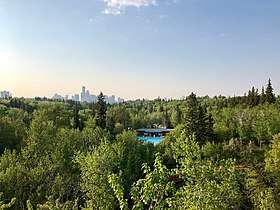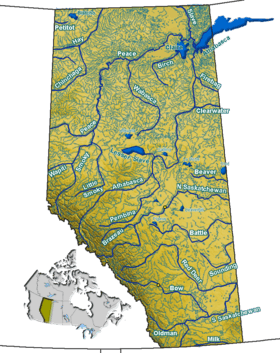Mill Creek Ravine
Mill Creek Ravine is located Edmonton, Alberta, Canada and is a part of the River Valley parks and trail system. The end of the ravine opens onto the North Saskatchewan River valley near the west end of Cloverdale on the opposite bank from downtown.
| Mill Creek Ravine | |
|---|---|
 View of Mill Creek Ravine looking north, with the Mill Creek Pool in the foreground and downtown skyline in the background | |
| Location | |
| Country | Canada |
| Province | Alberta |
| Physical characteristics | |
| Source | |
| ⁃ location | Alberta |
| Mouth | |
⁃ location | North Saskatchewan River |
⁃ coordinates | 53°32′23″N 113°28′41″W |
History
The creek is named after a flour mill that was established by William Bird in 1878.[1] The creek begins in rural sloughs just south and east of Anthony Henday Drive (just south of its junction with Highway 14 and to the south-east of the Meadows community), and flows northward to an outfall near 92 Avenue between the neighborhoods of Strathcona and Bonnie Doon. Large segments of the creek were diverted into culverts during the 1960s and 1970s including a section that runs underneath the Davies/Coronet Industrial areas in the city's south-east, and the lower reaches of the creek, which was diverted to a tunnel and concrete outfall structure several meters above the North Saskatchewan River. The outfall emerges on the East bank of the North Saskatchewan River at approximately 95 Avenue. It is clearly visible from the James MacDonald Bridge. The city has begun public consultations on re-establishing the natural, surface flow ("daylighting") the downstream reach of Mill Creek.[2]
The ravine was once home to part of the Edmonton, Yukon & Pacific Railway line. The line ran from the Canadian Pacific line at about 67 Avenue, across 99 Street, and down into Mill Creek Ravine. It went down through the ravine and out across the Low Level Bridge. The railway also served Gainer's meat packing plant, a large scale meat packing facility once located on the western edge of the ravine at 79 Avenue.[3]
.jpg)
In 1954 most of the railway through the ravine was abandoned, with only the section south of the meat packing plant (between 77 and 80 Avenues) remaining in use. This section was abandoned by 1980. In the early 1980s the City of Edmonton converted the railway right of way into a bicycle and walking path extending from one end of the ravine to the other. Four wooden railway trestles are in use for the bicycle path. The largest of these, the Mill Creek Trestle at 76 Avenue, was recognized as a Municipal Historic Resource in 2004.[4] In 1988 the Edmonton Historical Board erected a plaque in Mill Creek Park commemorating the railway.
The Mill Creek Outdoor Swimming Pool, located in the ravine at 8200 - 95A Street, is a popular summertime destination. Other nearby attractions include the Argyll Velodrome and BMX course and the Muttart Conservatory.[5]
Notable events
On July 4, 1908, two people drowned in Mill Creek in isolated incidents, two hours apart from each other.[6] Both drownings occurred at the same location, where the creek connected with the North Saskatchewan River.
Communities
- Strathcona
- Bonnie Doon
- Ritchie
- King Edward Park
- Hazeldean
- Avonmore
- Argyll
- Greenview
- Jackson Heights
- Minchau
- Kiniski Gardens
- Wild Rose
- Silver Berry
- Tamarack
- Aster
See also
External links
Notes
- Herzog, Lawrence (March 22, 2007). "Industry on the river". Real Estate Weekly. Archived from the original on September 27, 2007. Retrieved February 19, 2015.
- "Mill Creek Daylighting". Natural Areas & Urban Biodiversity. City of Edmonton. April 3, 2018.
- Herzog, Lawrence (October 12, 2012). "Edmonton's Lost Packing Plants". Edmonton Heritage Council. Archived from the original on November 1, 2012. Retrieved February 19, 2015.
- "Mill Creek Trestle Bridge". Canada's Historic Places. Canadian Register of Historic Places. Retrieved 30 May 2018.
- Edmonton, City of (2020-01-28). "Mill Creek Ravine". www.edmonton.ca. Retrieved 2020-01-29.
- "Strathcona Evening Chronicle July 4, 1908 Page 1". peel.library.ualberta.ca. Retrieved 2018-11-12.
